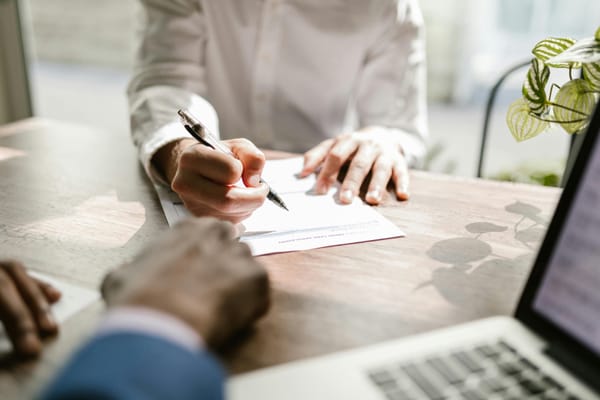The First Step to Financial Freedom: Gaining Clarity Over Your Money

Managing money can feel like a constant struggle. You work hard, earn your paycheck, and see the money coming into your account, but never seem to know where it goes. Personal finance often feel like this opaque box that we have no understanding of. To make matters worse, most people don't know where to begin to fix the situation, leaving them feeling powerless, frustrated, and confused. What you need is financial clarity—understanding where your money is going, so you can make better decisions and feel more in control.
Most people think that budgeting is the key to taking control of their finances. While budgeting is important, the real first step is understanding your spending. Without knowing exactly where your money is going, trying to budget is like trying to navigate without a map. You can't move forward without knowing where you currently are. It might surprise you, but tracking your expenses is essential to taking control of your finances—it’s what gives you the clarity and insight needed to make smart decisions about your money.
Tracking your spending isn’t about restricting yourself or making things harder—it’s about practicing financial mindfulness, understanding your habits, and making better choices. It’s about seeing the full picture of where your money goes and using that information to create a spending plan that works for you. Tracking your expenses is the first step towards gaining clarity, reducing stress, and ultimately building financial wellness and freedom. It’s about empowering yourself with the knowledge you need to make intentional choices that align with your goals.
The Power of Awareness
Tracking your expenses provides a clear picture of your financial life. Without this awareness, it's like trying to put together a puzzle without knowing what the final picture is supposed to look like. Many people are surprised by the amount of money they spend on non-essential purchases or by how quickly small expenses add up over time. By taking the time to track every dollar, you can bring mindfulness to your spending, revealing patterns that might be holding you back from reaching your financial wellness goals.
For example, that daily coffee might seem like a small indulgence, but when tracked over an entire month, it could add up to a significant amount—money that could be redirected toward paying off debt or building an emergency fund. Expense tracking is like shining a light on your habits, making it possible to adjust them and redirect your resources to where they truly matter.
The Benefits of Expense Tracking
When you track your expenses, you can:
- Identify Unnecessary Expenditures: Pinpoint areas where you're spending more than you realized, such as subscription services you forgot about or impulse purchases.
- Create a Realistic Spending Plan: Knowing exactly where your money goes allows you to create a spending plan based on real numbers, not estimates.
- Reduce Financial Stress: With a better understanding of your finances, you can plan for upcoming expenses, avoid surprises, and feel more in control.
- Achieve Financial Goals Faster: Whether you're saving for a vacation, a new car, or your retirement, tracking expenses helps you find extra funds that can be put towards those goals.
Making Expense Tracking a Daily Habit
Expense tracking may seem tedious at first, but there are ways to make it easy and fit seamlessly into your daily routine. The key to making expense tracking work is consistency. By incorporating it into your daily routine, it becomes second nature. Here are some ways to make it easier:
- Use Technology to Simplify: There are many tools and apps that make tracking expenses less of a chore. Apps like the Finesse app can capture purchases from receipts and automatically categorize transactions for you, making the process almost effortless.
- Capture Expenses Regularly: Choose a consistent time to update your expense tracker. This could be at the end of each day or after every purchase. The important thing is to make it a habit.
- Start Small: If tracking every single expense feels overwhelming, start by tracking just one category, such as dining out or entertainment. Once you get comfortable, you can expand to include other categories.
Sources of Information to Track Your Expenses
To effectively track your expenses, it's important to gather accurate information about your spending. Here are some common sources to help you get started:
- Bank and Credit Card Statements: Reviewing your monthly bank and credit card statements is one of the easiest ways to see where your money is going. These statements provide a detailed list of transactions that can help you categorize your spending.
- Receipts: Keeping receipts for your purchases is another way to track spending, especially for cash transactions. Collecting and reviewing receipts helps you get a more complete picture of your expenses.
- Manual Tracking: Manually writing down each purchase as you make it can also work, though it can be time-consuming and is not always practical. This method is useful if you want to be extra mindful of your spending, but using apps or statements is generally more efficient.
Tools and Methods to Track Your Spending
- Mobile Apps: Using an app like Finesse can make tracking seamless. These apps often provide useful visualizations of your spending patterns, helping you see where adjustments are needed.
- Spreadsheet: For those who prefer more control, a simple spreadsheet can work wonders. You can customize it to suit your needs, categorize your spending, and see your progress over time.
- Pen and Paper: Sometimes the old-fashioned way works best. Writing down each purchase can give you a tangible connection to your spending habits, helping you stay mindful and fostering a sense of financial wellness.
The most important part is finding a method that fits your lifestyle, so you can stick to it and make tracking expenses a habit.
The Bottom Line
By committing to tracking your spending, you’ll gain the confidence that comes from financial mindfulness—knowing exactly where your money is going. You’ll feel empowered to make intentional choices, reach your financial goals faster, and reduce the stress and uncertainty that come with feeling out of control.
This simple habit is the key to building a future where you’re in charge of your finances, allowing you to live the life you want without constantly worrying about money. With consistent effort, you'll see how this foundational step sets the stage for better financial management and, ultimately, financial freedom.
The easiest way to financial freedom?
Use the Finesse app to track your expenses and gain clarity over your finances.
Learn More



